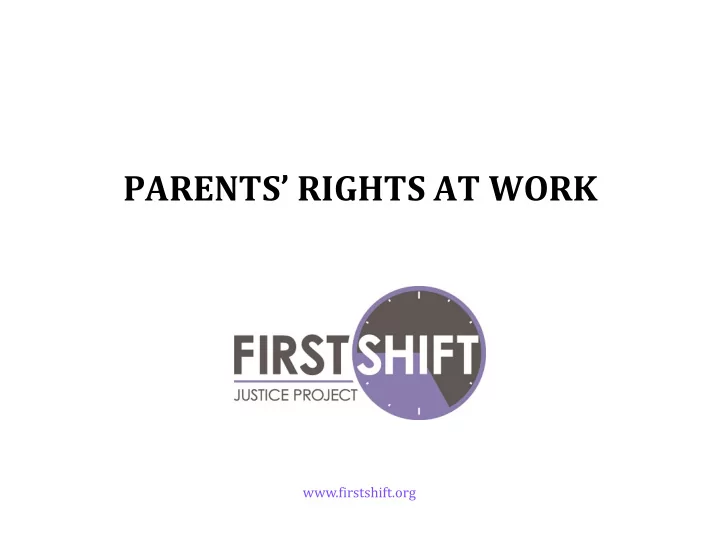

PARENTS’ RIGHTS AT WORK www.firstshift.org
FIRST SHIFT’S MISSION To help working mothers exercise their workplace rights to avoid job loss. www.firstshift.org
Basic Principles for Employment Law • The applicable law is the law of the place where the work is being performed. • Most employees are “terminable at will.” Exceptions: Union employees and government employees. www.firstshift.org
A Working Parent May Have the Right to Take Time Off: If she is sick. If her child is sick. If she or a member of her family has a serious health condition. If she needs to attend her child’s school- related events, including IEP meetings. www.firstshift.org
Paid Sick Days • Employees who work in D.C. and MD have a legal right to paid sick days. • How much time depends on the size of the employer . • Paid sick time can be used to care for sick children, including doctors’ visits. www.firstshift.org
D.C. Paid Sick Leave Depends on the size of the employer in D.C.: � Less than 25 workers: 3 days per year � Between 25-99 workers: 5 days per year � More than 100 workers: 7 days per year *Rolls over to next year if not used. * Must work in D.C. 50% of the time. *Tipped workers: 5 days per year regardless of employer size. www.firstshift.org
D.C. Paid Sick Leave Also... � You can take your sick days after having worked 90 days. � An employer can only request a doctor’s note after 3 consecutive absences. � Retaliation prohibited for asserting right to paid sick leave. www.firstshift.org
Maryland Paid Sick Leave MD Healthy Working Families Act – 40 hours of paid sick leave. (15+ employees) Montgomery County Paid Sick Days Law – Up to 56 hours of paid sick leave, depending on size of employer. www.firstshift.org
Employers’ Paid Sick Leave Policies An employer may have its own sick leave policies that provide more leave than the law requires. Employers have broad discretion to make their own rules about the leave they offer, as long as they don’t discriminate. www.firstshift.org
Family Medical Leave Act Pursuant to the D.C. Family Medical Leave Act and federal Family Medical Leave Act, parents can take job-protected time off from work to care for their children who have serious health conditions. A “ serious health condition ” is defined as an illness, injury or impairment that involves hospitalization or ongoing treatment by a medical provider. www.firstshift.org
Family Medical Leave Act D.C. FMLA adopts a broad definition of “family,” including grandparents and others who stand in loco parentis . www.firstshift.org
Family Medical Leave Act • Applies to companies with 50 or more employees. • Employees must have one year of service. • Employees must have worked at least 1250 hours. • Provides 12 weeks of job-protected leave. • D.C. FMLA is different. www.firstshift.org
FMLA, Continued • Employees must give 30 days’ notice if the need for leave is foreseeable (e.g. pregnancy) • Medical certification must be submitted within 15 calendar days of the request. • Medical forms must be specific as to the duration of the leave and the reason it is needed. www.firstshift.org
FMLA, Continued Intermittent Leave • Employees may take intermittent or reduced schedule leave under the federal or D.C. FMLA upon a showing of medical necessity. • Employees should give the employer as much notice and certainty as possible about their need for leave. www.firstshift.org
The Right to Return to Work • FMLA leave is “job protected.” • You have the right to return to the same or an equivalent position. www.firstshift.org
Virginia There is currently no state law in Virginia which gives employees the right to any kind of leave from employment for any reason, paid or unpaid. www.firstshift.org
D.C. Universal Paid Family Leave Act New law which provides for: � 8 weeks of paid leave insurance to care for newborn. � 6 weeks of paid leave insurance to care for sick family member. � 2 weeks of paid leave insurance to care for self if illness. Applies to part-time & full time workers. www.firstshift.org
D.C. Universal Paid Family Leave Act Does not apply to federal or D.C. government employees. Starting July 1, 2019, D.C. employers will be required to make their first quarterly contributions to the fund. Starting July 1, 2020, D.C. employees may apply for the leave insurance. www.firstshift.org
D.C. Universal Paid Family Leave Act Note: This law gives D.C. employees the right to receive insurance payments while they are on leave for a qualifying reason but does not give employees the right to job-protected leave! www.firstshift.org
D.C. Parental Leave Act Provides D.C. parents and guardians up to 24 hours of unpaid time off to attend their children’s school events. www.firstshift.org
Workplace Discrimination Title VII, Civil Rights Act of 1964 Americans with Disabilities Act *These federal laws only apply to employers with 15+ employees. www.firstshift.org
Local anti-discrimination laws D.C. Human Rights Act Montgomery County Human Rights Act Prince George’s County Human Rights Act * Cover workplaces with 1+ employees. Exception: Domestic workers in D.C. www.firstshift.org
Family Responsibilities Discrimination � Discrimination against an employee because of his or her caregiving responsibilities. � D. C. and Montgomery County prohibit discrimination on this basis. � It may also be possible to assert a claim under federal Title VII. www.firstshift.org
Associational Claims under A.D.A. An employer may not deny employment opportunities to or terminate a parent of a child with a covered disability under the A.D.A. because of: � Expense; � Disability by association; or � Distraction. www.firstshift.org
All working parents should: • Read the employee handbook. • Follow proper procedures for requesting leave. • Notice how others are treated. • Keep contemporaneous written records. • Complain of discrimination via proper channels. • Write down communications with employer. • Do not quit! www.firstshift.org
Contact us: Laura Brown lbrown@firstshift.org Susanna Barron (Espanol) sbarron@firstshift.org (240) 241-0897 1227 Good Hope Rd. S.E. Washington, DC 20020 www.firstshift.org www.firstshift.org
THANK YOU ! www.firstshift.org
Recommend
More recommend